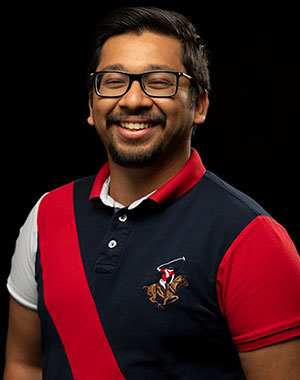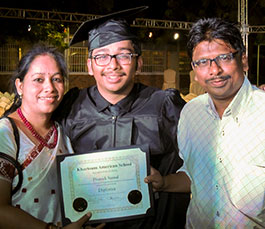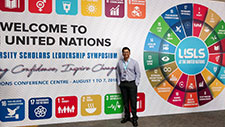Red Fox Spotlight: Prateek Samal ’19

Prateek Samal ’19
Elisabeth Tavarez
May 31, 2019—Prateek Samal ’19 is an overachiever. The business administration and economics double major has a near-perfect grade point average, is a member of Marist’s Honors Program, and will soon begin studies in Brown University’s Master of Public Affairs program. As he puts it, “I always do the best I can. I even start class assignments way too early—my friends hate it!” So what drives Samal to work so hard? “My family history has pushed me. My father is from a poor village in India and lost his father when he was young, but he worked incredibly hard and eventually became a diplomat. If I succeed, it would make all of his sacrifices worth it.”
Although he is the son of a diplomat from India, Samal has never actually lived in his parents’ home country. Instead, he grew up in Sudan, Cuba, Poland, Austria, and Australia. (For the record, Cuba was his favorite.) As Samal finished up high school in Sudan, he applied to colleges and universities in the U.S., U.K., and Canada. As it happened, his guidance counselor at the Khartoum American School knew Joe Giacalone, Marist’s Executive Director of International Admission. Samal learned all about Marist’s business program, small classes, and beautiful campus and decided to attend. The College was both new and familiar to him. “All of my teachers in high school were American, so the schooling experience was similar—but living in the U.S. is so different.”

Prateek Samal with his parents after graduating from the Khartoum American school in Khartoum, Sudan
Samal’s international background had some definite advantages as he navigated American college life. He says, “I think my upbringing really opened my eyes to working with all kinds of people with different mindsets and cultures. You learn what to say and what not to say. I’m also more aware of just how vast the world is and how much there is to learn and know.” He also notes that many Americans haven’t had the experience of living in a country and not knowing the language, something that can be extremely humbling. For his part, Samal speaks English, Spanish, Hindi, and Odia (the language spoken in his parents’ home state of Odisha), and he has learned to move seamlessly across different cultures.
During his time at Marist, Samal reports that he has had an extremely positive experience. While admitting to being nervous at first about moving to the U.S., Samal reports that has always “felt very welcome” at Marist and has formed a special bond with other international students because of their “unique shared experiences.” He also credits his experience as a Resident Assistant in Leo Hall with helping him become more extroverted, learning how to talk to all kinds of people, and honing his community-building skills.
Samal says that the faculty at Marist have been another major highlight, noting that “they’re always available for you.” Under the mentorship of Affiliate Professor of International Business Detelin Elenkov, Samal was part of a team that placed second overall in the inaugural International Business Case Competition at San Diego State University last year; it was the first time Marist had fielded a team in an international business competition, and the students bested competitors from several larger institutions with strong international business reputations. He was also one of three students from the School of Management selected to travel to Thailand for a United Nations Leadership Symposium. In addition, Samal worked closely with Assistant Professor of Management Melinda Weisberg to conduct research on immigration in the Hudson River Valley.

Prateek Samal at the United Nations Leadership Symposium in Thailand
Perhaps the most significant research Samal has done at Marist was for the Honors Program. Working under the guidance of Weisberg, his senior project was titled “A Comparative Review on Child Marriages in India and Ethiopia,” and it recommends ways in which India can emulate Ethiopia’s success in increasing its median marriage age. He did an extensive literature review, looked at legal codes and census data, and utilized reports and data published by various United Nations agencies. This subject is of personal interest to Samal because he is a frequent visitor to his parents’ home villages, and he has seen firsthand the negative consequences of child marriage. (At 15.5 million, India has the highest number of child brides in the world.) Samal observes, “It infuriates me to see young people robbed of a chance to live and pursue an education. Of course, this is a practice that disproportionately affects girls.”
Going forward, Samal will take what he’s learned in business administration and economics (not to mention his minors in global studies and accounting) and apply them to his graduate work at Brown. His initial goal after completing his master’s degree is to work at UNICEF or Save the Children in preparation for a career at the United Nations. His ultimate goal is to start an NGO in India to combat the scourge of child marriage. Based on his senior research project, Samal knows that it’s possible to make progress on this issue—but it’s important to build consensus. He notes, “In Ethiopia, both the politicians and the people agreed that child marriage is bad, and they worked together to improve things. That same consensus has to develop in India.” Given his ability to relate to people from all over the world and from all walks of life, there is probably no one better positioned than Samal to bring people together around a solution.
© Pentera, Inc. Planned giving content. All rights reserved.
Disclaimer


